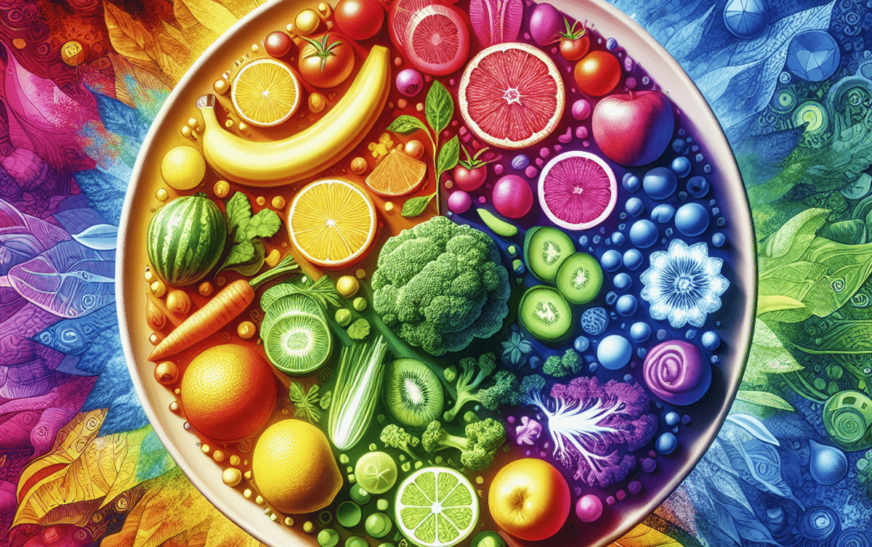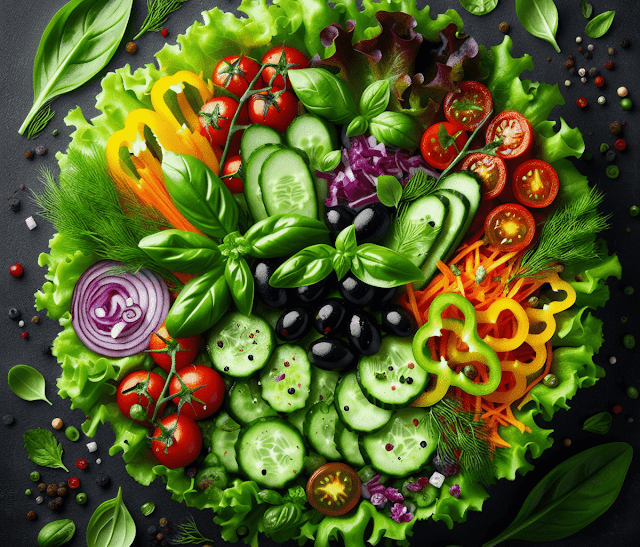Introduction to the Alkaline Vegan Diet
Alkaline Vegan Foods is a new approach to eating that aims to keep your body healthy by focusing on alkaline foods and avoiding acidic ones, to maintain a balanced pH level.
Understanding pH and Its Importance
The Alkaline Vegan Diet focuses on keeping your body in a healthy balance. pH is used to determine if something is acidic or alkaline. A pH of zero means it’s very acidic, 14 means it’s very alkaline, and 7 is considered neutral. Your body naturally prefers to be slightly alkaline, around 7.4.
How the Alkaline Vegan Diet Works
The Alkaline Vegan Diet focuses on eating foods that help maintain a healthy pH balance in your body. Here’s how it works:
- Eat more of these foods:
- Fruits
- Vegetables
- Soybeans
- Tofu
- Nuts
- Seeds
- Legumes
- Some grains
These foods are rich in alkaline minerals like potassium, magnesium, and calcium.
- Avoid these foods:
- Dairy products
- Eggs
- Meat (including fish and poultry)
- Processed foods
These foods can disrupt the pH balance as they are acid-forming in the body.
The goal of the Alkaline Vegan Diet is to eat more foods that make your body more alkaline, and less foods that make it more acidic. This is believed to have many health benefits.
The Benefits of a Balanced pH Level
A balanced pH level is important for your body to function properly and stay healthy. Your diet plays a big role in maintaining this balance.
How to Follow an Alkaline Vegan Diet
Adopting an alkaline vegan lifestyle involves making conscious choices to eat foods that create an alkaline environment in the body. Here are the key principles and benefits:
Key Principles of the Alkaline Vegan Diet:
- Focus on fresh fruits and vegetables, as they are typically high in alkalinity.
- Include alkaline grains like quinoa and millet.
- Drink pH-balanced water that is neutral or slightly alkaline.
- Limit consumption of acidic foods such as coffee, alcohol, and refined sugars.
- Choose plant-based proteins like lentils, chickpeas, and almonds.
Benefits of Adopting an Alkaline Vegan Lifestyle:
- Improved Digestive Health: Many people experience better digestion when they eat a diet that is high in fiber from fruits and vegetables.
- Natural Detoxification: Alkaline veganism helps the body naturally eliminate toxins by reducing the consumption of processed foods.
- Increased Energy Levels: The abundance of vitamins, minerals, and antioxidants in an alkaline vegan diet can lead to higher energy levels and overall vitality.
- Weight Management: The nutrient-dense, low-calorie foods commonly found in an alkaline vegan diet can support efforts to maintain a healthy weight.
- Disease Prevention: While more research is needed, some evidence suggests that following an alkaline diet may reduce the risk of certain chronic diseases.
By adding these principles into your daily routine, you adopt a lifestyle that focuses on not only the food you consume but also its impact on your body’s equilibrium.
Top 10 Alkaline Foods for Every Vegan’s Kitchen
Including a variety of alkaline foods is crucial for the alkaline vegan diet and its variations, such as the alkaline raw vegan diet. Here are ten important alkaline foods that are ideal for a vegan kitchen:
1. Leafy Greens
- Spinach, kale, and Swiss chard are examples of leafy greens that are high in minerals and have an alkalizing effect on the body.
- They help with digestion, boost energy, and provide important nutrients like iron, calcium, and magnesium.
2. Citrus Fruits
- Oranges, lemons, and grapefruits may taste sour, but they have a positive effect on the body’s pH levels once they are digested.
- These fruits are packed with vitamin C, which helps boost immune function and maintain healthy skin.
3. Avocado
- Avocado is a creamy fruit that is rich in healthy fats and potassium. It helps regulate blood pressure and promotes heart health.
- Avocados also contain fiber, which is beneficial for digestive health.
4. Almonds
- Almonds are not only alkaline-forming, but they also contain protein and vitamin E.
- They are great for snacking or adding to dishes for extra texture and nutrients.
5. Quinoa
- Quinoa is a gluten-free grain that is a complete source of protein, containing all nine essential amino acids.
- It can be used in various meals, such as breakfast porridge or dinner bowls.
6. Cucumber
- Cucumber is hydrating and has a cooling effect on the body.
- It contains antioxidants that can help fight oxidative stress.
7. Broccoli
- Broccoli is a healthy vegetable that helps with detoxification.
- It can be eaten raw or cooked and adds crunch and flavor to meals.
8. Watermelon
- Watermelon is hydrating and provides vitamins A, C, B6, and lycopene – an antioxidant important for heart health.
- Its refreshing sweetness pairs well with savory dishes or can be enjoyed on its own.
9. Kale
- Kale is a super nutritious vegetable that contains important vitamins and minerals. It can be added to smoothies or salads to give them a healthy boost.
10. Chia Seeds
- Chia seeds are small but packed with beneficial nutrients like omega-3 fatty acids, fiber, protein, and various micronutrients.
- They can easily be added to smoothies or used to make chia pudding, which is a satisfying snack or breakfast option rich in alkaline properties.
These Alkaline Foods for a Vegan Diet not only provide balance but also offer a wide range of nourishment. By incorporating these foods into your meals, you not only embrace the principles of an alkaline raw vegan diet but also benefit from the broader advantages of plant-based nutrition.
Understanding the Potential Health Benefits
Switching to an Alkaline Vegan Diet can improve your health in many ways. This diet focuses on eating fresh fruits, vegetables, and whole foods that are packed with important nutrients. Here are some key health benefits of following this dietary approach:
- Stronger Bones
A diet rich in fruits and vegetables has been linked to stronger bones and a lower risk of osteoporosis. Foods that promote alkalinity contain important minerals like calcium, potassium, and magnesium, which are essential for maintaining bone strength.
- Maintaining Muscle Mass
Following an alkaline diet can help preserve muscle mass as you get older by providing the right balance of minerals needed for muscle function.
- Boosted Energy Levels
Eating nutrient-dense foods that are high in vitamins and minerals can naturally increase your energy levels.
- Effective Weight Management
Consuming a high amount of alkaline foods such as fruits and vegetables can aid in maintaining a healthy weight due to their lower calorie content and higher fiber, which helps keep you feeling full.
- Improved Immunity
Alkaline vegan food options provide essential nutrients that support a healthy immune system, potentially reducing the frequency of common illnesses.
- Preventing Chronic Diseases
Following an alkaline diet may reduce inflammation, and lower the risk of high blood pressure and stroke. Incorporating alkaline-rich foods aligns with general dietary recommendations for good health. Consult a healthcare professional before making significant dietary changes.
Conclusion
Eating an alkaline vegan diet can bring many health and wellness advantages. When you consume alkaline foods, it can help create a less acidic and more alkaline environment in your body, possibly reducing the risk of certain diseases.
The alkaline vegan diet focuses on balancing blood pH levels by eating alkaline foods for better health. By following a plant-based diet rich in alkaline foods, you can nourish your body, minimize processed and acidic foods, and promote detoxification.
One of the key benefits of the alkaline vegan diet is its potential to increase energy levels. By consuming nutrient-dense foods that are high in vitamins and minerals, you may experience a natural boost in energy.
Furthermore, the alkaline vegan diet can also assist with weight management since it emphasizes consuming fruits and vegetables. These foods have fewer calories and more fiber, which can make you feel full and prevent excessive eating.
Eating alkaline vegan food can help boost your immune system and potentially lower inflammation and the risk of certain health conditions. However, the exact health benefits are still a topic of debate.
To sum up, choosing to follow an alkaline vegan diet can have positive effects on your health and help prevent long-term illnesses. By adding more foods that are alkaline-rich to your everyday meals, you can improve your overall well-being. Nevertheless, it is always advisable to seek advice from a healthcare professional before making any major changes to your eating routine.
.


.png)
.png)








